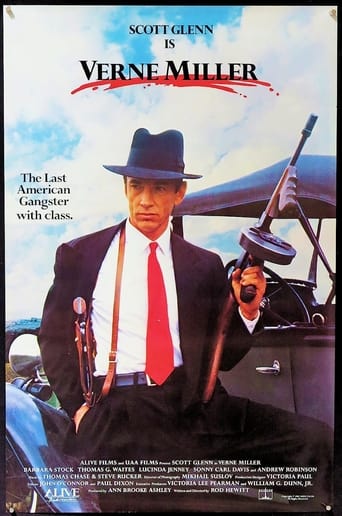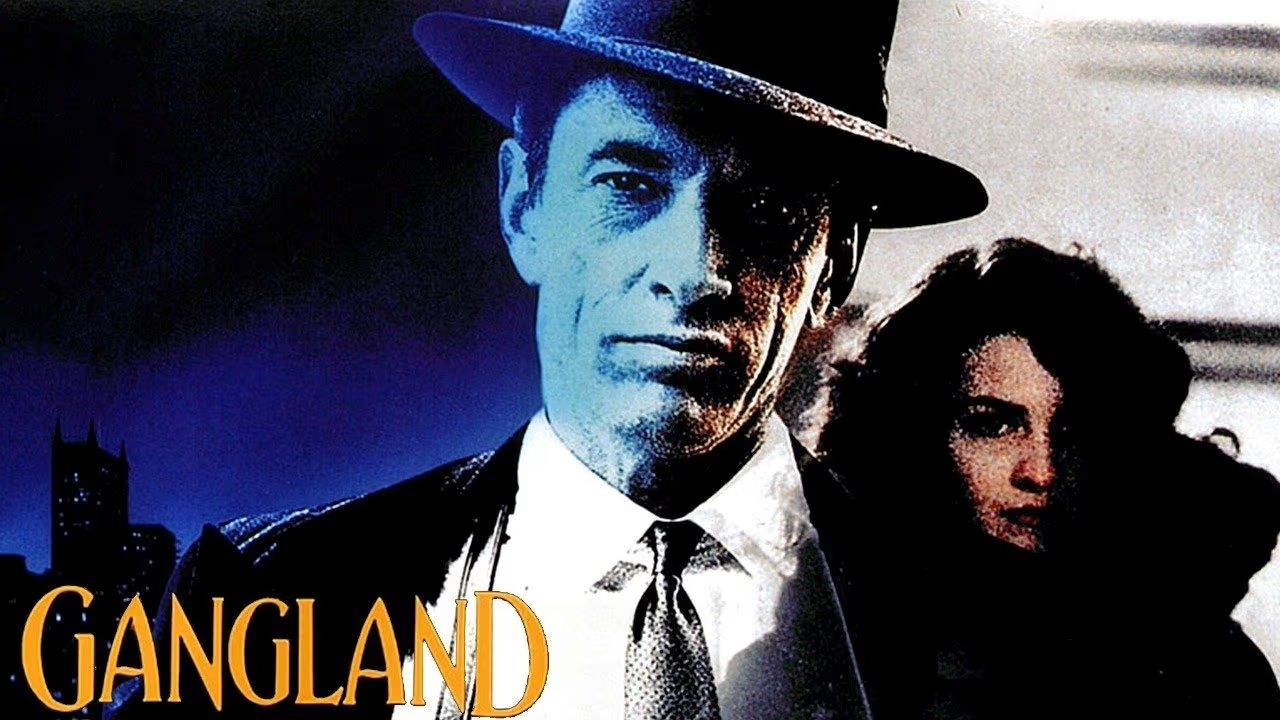Joe Day
As a native Kansas Citian and fan and somewhat of a historian of the Melvin Purvis, gangland era, I came across this flick the other day. The station ran it as "Gangland." As someone else commented, the movie has the look of a 1970s movie as far as film stock instead of almost 1990. In fact it could pass as an extended episode of The Wild, Wild West. I came in after the movie started so it took me a while to figure that the character of Al Capone was actually the actor I never would have thought him to be. He appeared to be channeling Brando, or trying to. I didn't find Miller a particularly interesting character either; the director seemed to want him in bed with as many women as possible to justify the diagnosis of syphilis even though having VD didn't seem to slow down either Capone or Miller in that regard nor did it appear to bother the many ladies either although they must have known - didn't everybody? But the film really lost me during the Kansas City Massacre. Who did they think they were fooling with that ramshackle train depot? Anybody whose been to KC knows it has one of the most magnificent train stations in the world that dates from around 1917. The credits revealed location shots were in Alabama. I guess they were too lazy to come up to KC or couldn't even look for stock footage of the depot. All in all- an OK flick if you have nothing else to do.
lost-in-limbo
Scott Glenn takes on the role of the infamous mob assassin Verne Miller and he simply excels in the part that fits his dry, lean persona. While the production might be low-budget, execution mildly slapdash (although it does have some imaginative flourishes) and the story's account of this larger-than-life figure is somewhat makeshift in its sensationalized details when he becomes an important underworld figure. It's the performances that drive this one home, especially Glenn. I always found him to be an under-appreciated actor and here he's no different. In 1925, ex-lawman Verne Miller is released from prison after spending two years there for embezzlement. Soon he finds himself working along side Chicago Mobster "Scarface" Capone and becoming his number one hit- man. But things begin to change for the worse when he starts going behind Capone's back, the Feds start interfering and his health starts declining.Gangland: "The Verne Miller Story" is a distinctively stark mobster feature (The intro is stylishly presented, like it's taken out of a Bond feature with its saucy opening song). Each scene seems to move quite quickly as in the end it's rather a simplistic take on the rise and fall of Verne Miller. Perfect it's not, but thoroughly entertaining and Glenn gives his character quite a humane quality which stands out in certain scenes when compared to the calculative nature he goes about his business. The dramatics of the narrative can be all over-the-place, sometimes even being comedic in an unintentional manner. Still there are offbeat moments (especially surrounding Thomas G. Waites' portrayal of Capone), a surreal quality (carnival setting and a certain death scene or two) and the script have its witty exchanges. Even brutal, without being excessive in the visuals (like the Kansas City Massacre, which saw Capone turn his back on Millar). Miller is portrayed as quite ladies man, and the women on show give strong performances with the likes of the seductive Barbara Stock (however I did find her narration unnecessary), Lucinda Jenny and Diane Salinger. Also showing up in accessible support are Ed O'Ross, Sonny Carl David, Andrew Robinson and Xander Berkley.
rhino8268
While the movie is about Verne Miller's life it also documents one of the most important events in law enforcement history, the Kansas City Massacre. It was this event that took place at Union Station Kansas City in 1933 that permitted Federal Agents to carry weapons. However, two points to bring up. First is continuity. At the time of the Kansas City Massacre, Al Capone was in Alcatraz and was not, as the movie indicates, out of prison to tell his men not to touch Frank Nash. The second relates to reality. Union Station Kansas City was depicted as an old wooden train "depot" when in reality it is a magnificent 850,000 sq. ft. edifice of marble and granite. Other inconsistencies have been brought to light with recent research. The most significant of these is that the officers killed at Union Station were not killed by Vern Miller and his two cohorts but by other police officers. This was uncovered after the production of this movie.
Helen-7
It's really funny - watching "Verne Miller" today, after the triumph of "The Miller's Crossing". Where Coen brothers weave a brilliantly tricky and slick tale of deceit and treachery, director Rod Hewitt chooses more simple and straightforward approach to a story of real gangster Verne Miller who once has been as famous as Al Capone. And the man was worth it. Verne Miller began his criminal career during "the roaring twenties" and had been killed in 1933 (his killers were never found). His name was on the front pages for almost a decade and yet he remained a mystery. He liked to show off: once he forced his victim to inform the newspapers about his own death (the man was executed by Miller a few moments later with a receiver in his hand - thus providing reporters with the first "live" murder coverage in history). As irresistibly sexy as imaginatively cruel, this man was a true Don Juan: women loved Miller and stayed loyal to him not only in his days of glory but even when he became desperate and ill animal, hunted by police, FBI and criminals. Larger than life and bigger than his time, Verne Miller was also a gentleman: he couldn't fail a friend as well as he couldn't miss a shot - that's why he didn't survive in the world of organized crime. Film's stylized, half-documentary style (probably imposed by the budget restraints) paradoxically clicks with Miller's outrageous story (a little more of "attitude" - and it would become utterly camp). Hewitt's direction sometimes is too reserved and detached, but he manages to avoid both romantization and cheap moralism while Scott Glenn gives a winning performance as Vern Miller - he plays him as true crime artist, vulgar and pathetic poet of adrenalin rush. Of course, the material itself is very rewarding, but it's Glenn's strong presence that makes Miller's flights of fancy quite convincing - for example, once he fools the enemy and his bodyguards by pretending a mannequin with a painted face. While other actors occasionally slip into self-parody, Glenn shines in both action and romance, exuding inner force and raw sexuality. Looking eerily Bogartian with his rugged face and sardonic grin, Glenn is the main reason to watch this movie, as repulsively charismatic as its protagonist. Verne Miller, sporting garish red ties and old-fashioned code of honour, seems an ironic monument to American individualism, crashed by corporative society - a lonely, tragic figure in a bleak, desolate landscape. It's a pity Vern Miller hadn't been born fifty years earlier. It's a pity Scott Glenn didn't end up in "The Miller's Crossing".


 AD
AD




